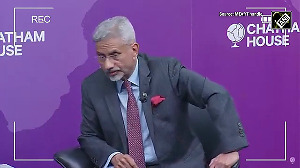The roads are choked, the airports look no better than railway stations, power outages now common even in metros such as Mumbai, and water supply rationing commencing even before the onset of summer.
What is more galling is the inadequacy of even the 'private' infrastructure, which should have been in place since the economy has been showing sustained upswing for 8-10 years.
Airlines--especially private ones like Jet--have not kept up to date with the overall growth in customer traffic. One only has to try to reach one of the customer service numbers for making any changes in reservations or tele-check in to notice the abominable increase in waiting time in the last few months. Getting a decent room at short notice in any of the major cities is becoming next to impossible despite being forced to pay a king's ransom.
What is most disconcerting is the very visible deterioration in the customer service orientation--some of the so-called luxury hotels in Mumbai and Bangalore have not even bothered to upgrade basic plumbing and furnishing to keep up with international benchmarks.
Users of mobile networks in major cities across India would have noticed the creeping degradation of service including access. Wireless data services now operate at a snail's throughput compared to when they were launched a couple of years ago. At most of the leading modern retailers, the time taken to check-out has worsened and the availability of trained sales associates on the shop floor has become more constrained.
Ironically, since the financial performance of almost all such consumer goods and service providers has surged remarkably, and the stock market has been rewarding the shareholders of such businesses beyond their wildest expectations, the top managements of these companies have every reason to feel smug or, worse, give short shrift to what their customers rightly deserve.
Fortunately, our democracy allows us to display our impatience with the political leadership if they do not respond to basic civic and economic needs of the society. Many recent elections have repeatedly proven that good governance cannot be superseded by any other issue, no matter how emotive it may be.
Likewise, the economic liberalisation of the last 15 years or so is now finally leading to a situation where very shortly, Indian consumers will be able to vote with their wallets as well. Kingfisher has already demonstrated in a short span of time that it can be a very worthy competitor to the current full-service leaders in the airline sector.
In the hospitality sector, the good news for the harassed business and leisure travellers may still be a good 2-3 years away, but it will happen once the various projects that have now been announced come to the market. In the case of telecom services, probably the government will have to intervene to ensure that all service providers adhere to basic quality parameters.
However, number portability, now likely to become a reality in the current year, can put some desired pressure on the service providers. As far as retail businesses are concerned, India is truly poised for a revolution within three years.
While it may be a while for the rural consumers to benefit from this change, almost all urban centres will see the (positive) impact of the mega change that is in the offing on account of some really powerful and exceptionally successful new entrants in this sector.
Much like the futility of predicting the voters' intentions through psephology and exit polls, I believe that the current tools used by various businesses to measure customer satisfaction and customer loyalty can at best give flawed insights into the consumers' minds, and, at worst, make a totally incorrect prediction of their future behaviour.
This may be on account of a host of factors including that fact that Indian consumers are yet not publicly vociferous, there are no "Ralph Naders" providing a beacon to the under-served customers; majority of Indian consumers are very young and many of them have only recently acquired some financial independence of their own, and most of them have yet to experience what truly good quality means either for products or for intangible services.
However, what is certain is that these consumers will learn very fast, and with increasing confidence and higher international exposure, they will start expressing their opinions loud and clear. They will also be willing to switch loyalty the very first time they believe someone can provide better product or service than the current options.
What should the fortunate beneficiaries of the current economic boom do? Many are expanding capacity, rightly, but probably not fast enough, leaving them vulnerable to new entrants who could get an opportunity to fill in the demand-supply gap. What they should be doing, but are not doing anything at all, or at best, very little, is to use a part of their windfall to upgrade quality and service standards beyond consumers' expectation.
Time and again, delighting consumers by exceeding expectation has been proven to be the most efficient tool for generating and retaining customer loyalty. Time and again, shortchanging consumers has also proven to be the surest way of fading into history!
Do you want to discuss stock tips? Do you know a hot one? Join the Stock Market Discussion Group.







 © 2025
© 2025